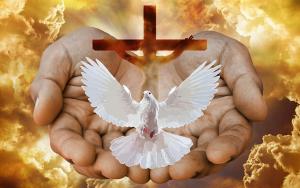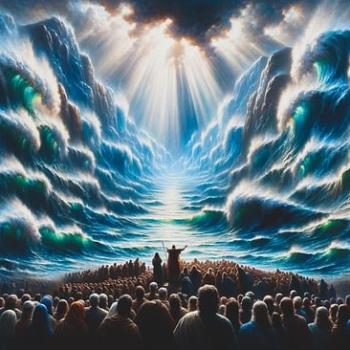
Saint Athanasius famously claimed that the “Son of God became man so that we might become God” (See Alexandria, Saint Athanasius Patriarch, and Penelope Lawson. On the Incarnation. St Vladimir’s Seminary Press, 1998). This statement invokes the question of the relationship between God and human beings. It is a question that Trinitarian anthropology seeks to answer.
Trinitarian Anthropology: A Definition Of Terms
At first glance, the terms Trinitarian and anthropology appear to be incongruent. After all, Trinitarian refers to the nature of God and the doctrine of the Trinity, while anthropology is the study of what a human being is.
However, the relationship and interactions between God and humans are fundamental to the Catholic and biblical worldview—Trinitarian anthropology endeavors to explicate this relationship between God and man, Creator and creation.
As such, Trinitarian anthropology is a theological approach that explores the nature of humanity by drawing parallels between the triune God (Father, Son, and Holy Spirit) and the human person, emphasizing relationality and the image of God in humankind. Trinitarian theology addresses both the nature of God (theology) and the nature of humanity created in the image of God (anthropology).
Applying the Trinitarian mystery to the human person and the development of Trinitarian anthropology from the time of Christ to the present is of significant importance to Catholicism.
The Historical Development Of Trinitarian Anthropology
Trinitarian anthropology and Catholic theology make one critical presupposition. That is, God, while transcendent, is knowable. Stated differently, the God of the Bible is a personal God.
Utilizing that presupposition as a point of departure, the early Catholic Church desired to understand the relationship between God the Father, Jesus, and the Holy Spirit, laying the groundwork for Trinitarian doctrine. Moreover, the Church sought to apply its understanding of the Holy Trinity to human relationships. While this could only be accomplished analogously, this effort supplied the foundation for Trinitarian anthropology.
For Thomas Aquinas, Trinitarian anthropology meant emphasizing the relational aspects of the Trinity and its implications for human relationships.
In a similar vein, contemporary theologians such as Henri de Lubac and Michele Schumacher have emphasized the relationality and community inherent in the Trinity, suggesting that humans are created for relationships with God and others. (See Schumacher, Michele M. A Trinitarian Anthropology. Catholic University of America Press. 2014).
Imago Dei In Trinitarian Anthropology
The concept of humans being created in the image of God (Genesis 1:27) is central to Trinitarian anthropology, suggesting that the human person mirrors the triune nature of God.
The imago Dei signifies that humans possess a unique dignity and likeness to the divine. The resemblance is not physical, of course. Instead, to be made in the image of God is to reflect certain qualities attributed to God. These qualities include intellect, free will, and the capacity for love and relationship.
Saint Augustine examined the mystery of the Trinity by seeking traces of it within the human personality, arguing that humans reflect the divine image and likeness. For Augustine, a reflection of the Holy Trinity is seen in the human capacity of memory, reason, and will, which he suggested correspond to the Father (memory), Son (reason), and Holy Spirit (will). (See Hippo, Saint Augustine, On the Trinity /St. Augustine ; Translated by Stephen McKenna. 1963).
Thomas Aquinas also saw the human capacity for intellect, love, and communion as a reflection of God. For Aquinas, God the Father represents the intellect, the Son represents love, and the Holy Spirit represents communion. (See Aquinas, Saint Thomas. The “Summa Theologica” of St. Thomas Aquinas. 1917).
Relational Natures Of God And Man
It is widely accepted that human beings are social creatures. From a Trinitarian anthropological perspective, this communal nature echoes the divine nature. As God is a family of persons (sharing one nature), so too humans are to be understood as inherently social and relational beings, reflecting the relational nature of God.
This relationality is most perfectly mirrored in the human family. For this reason, the Catechism states, “The Christian family is a communion of persons, a sign and image of the communion of the Father and the Son in the Holy Spirit” (Catechism of the Catholic Church, Paragraph 2205).
Indeed, by examining a human family, one can gain insight into the Holy Trinity. A nuclear family composed of a father, mother, and child are distinct in their personhood yet share the same human nature. Analogously, God as Father, Son, and Holy Spirit are three persons sharing the same divine nature.
Morality And Social Teaching
To some extent, Catholic social teaching is predicated on the imago Dei. Because human beings are made in God’s image, they possess inherent dignity. Moreover, if human beings are made in the image of God, and if God is the ground of objective morality, then it becomes clear that Trinitarian anthropology must also involve itself with morality and ethics.
This teaching has several implications. There is an emphasis on creating a society where all people have an opportunity to thrive. This is brought about through the principles of subsidiarity and solidarity. Particular strain is placed on caring for the poor and vulnerable (Matthew 25:35-40).
Conclusion
The core principle underlying Trinitarian anthropology is the idea that humans are fundamentally relational beings, mirroring the relationships within the Trinity. This means our existence and identity are deeply connected to our relationships with God, with each other, and even with the created world.

















